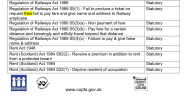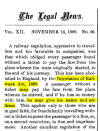At first glance I thought that the Rozenberg reference might be to his piece about submissions made to the Court of Appeal by Attorney-General Braverman, to be found
here. This thread is dealing with a proposition of law on the part of Merseyrail that is equally “striking and unusual” - judicial code for, putting it politely, “embarassingly wrong”.
I was surprised to discover that Rozenberg's piece actually deals with the charging of an offence under RoRA S.5(1) in the context of the introduction of the Single Justice Procedure. Surprised because, by virtue of the Criminal Justice Act 2003 (New Method of Instituting Proceedings) (Specification of Relevant Prosecutors) Order 2016, the range of offences for which railway operators can commence a prosecution by SJPN was then largely confined to those created by railway byelaws and did not extend to prosecution for a RoRA offence. (To elaborate, the SJP was a new method of instituting proceedings introduced by the Criminal Justice Act 2003. It was a procedure made available to 'relevant prosecutors' as defined by S.29 of the 2003 Act, and S.29(5)(h) made provision for additional prosecutors to be specified in an order made by the Secretary of State. A range of additional prosecutors was so specified in the 2016 Order, including, in Article 6, railway operators for a limited range of offences.)
Possibly the range of offences railway operators are permitted to prosecute via SJPN has been extended since the 2016 Order so as now to include RoRA offences, but I've been unable to find legislation creating such an extension of operators' powers - if there has been such an extension then no doubt someone better versed in criminal procedure than I will correct me. However, so far as I can tell from the copy paperwork she has posted, SJP proceedings against the OP for the offence alleged under S.5(1) RoRA were instituted by Merseyrail apparently in reliance upon an authority to do so that the company does not possess.
If I'm right about that, and Merseyrail had no authority to charge the OP with a RoRA offence by means of the Single Justice Procedure, then the status of the proceedings currently in progress comes into question. I suspect there must be an argument that if commencement of legal proceedings is attempted on the strength of an authority to do so that doesn't in fact exist, then such proceedings have to be treated as having been non-existent from the outset in the eyes of the law. And if that's the case, the error may be one that is incapable of rectification by application to the magistrates, because there would be no proceedings in connection with which such an application can be made. Alternatively, if magistrates do have jurisdiction to entertain such a corrective application, they could presumably correct the position only by a direction that the present 'proceedings' are at an end and that if Merseyrail still wishes to prosecute then the company would need to lay an information under the old, two-stage process.
I look forward to learning the upshot of any conversation with Merseyrail the OP may be having. If Merseyrail remains determined to press on with its prosecution of the OP, any such conversation notwithstanding, a challenge to the proceedings' legitimacy for the reasons discussed above may become worthy of consideration.






